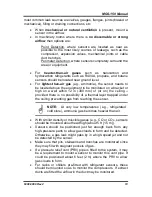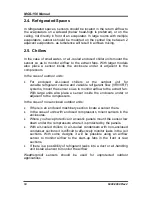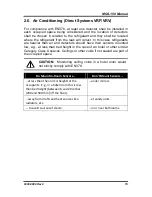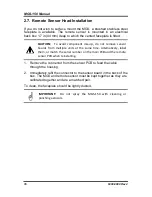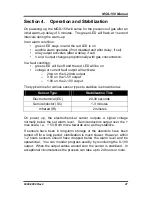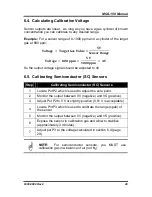
MGS-150 Manual
6309-9000 Rev 2
25
Bump Test
Exposing the sensor to a gas and observing its
response to the gas. The objective is to establish if the
sensor is reacting to the gas and all the sensor outputs
are working correctly. There are two types of bump test.
Quantified:
A known concentration of gas is
used.
Non-Quantified:
A gas of unknown concentration
is used.
Calibration
Exposing the sensor to a calibration gas, setting the
“zero” or standby voltage to the span/range, and
checking/adjusting all the outputs, to ensure that they
are activated at the specified gas concentration.
CAUTION:
Before you carry out the test or calibration:
•
Advise occupants, plant operators, and supervisors.
•
Check if the MGS is connected to external systems such
as sprinkler systems, plant shut down, external sirens
and beacons, ventilation, etc. and disconnect as
instructed by the customer.
•
Deactivate alarm delays if selected at JP5, JP6 as per
Figure 2 and Figure 3.
•
For bump test or calibration the MGS should be powered
up overnight. The instrument should be fully stabilized
per Section 4.
6.2. Bump Testing
After installation, the units should be bump tested. Expose the sensors
to test gas (NH
3
, CO
2
, etc.). The gas should put the system into alarm
and light the red LED. The delay prevents the audible alarm from
sounding and the relay from switching (if delay is set).
With a bump test you can see the functions of the sensor - the red LED
will light, the relay and audible alarm will function, and the output (0-10V,
for example) will show the gas level.
Ideally bump tests are conducted on site in a clean air atmosphere.
Summary of Contents for MGS-150
Page 10: ...MGS 150 Manual 10 6309 9000 Rev 2 Figure 2 EC or IR Sensor Components and Wiring...
Page 11: ...MGS 150 Manual 6309 9000 Rev 2 11 Figure 3 SC Sensor Components and Wiring...
Page 18: ...MGS 150 Manual 18 6309 9000 Rev 2 Figure 5 IP66 Housing with Splashguard...
Page 33: ...MGS 150 Manual 6309 9000 Rev 2 33...
Page 34: ...MGS 150 Manual 34 6309 9000 Rev 2...



